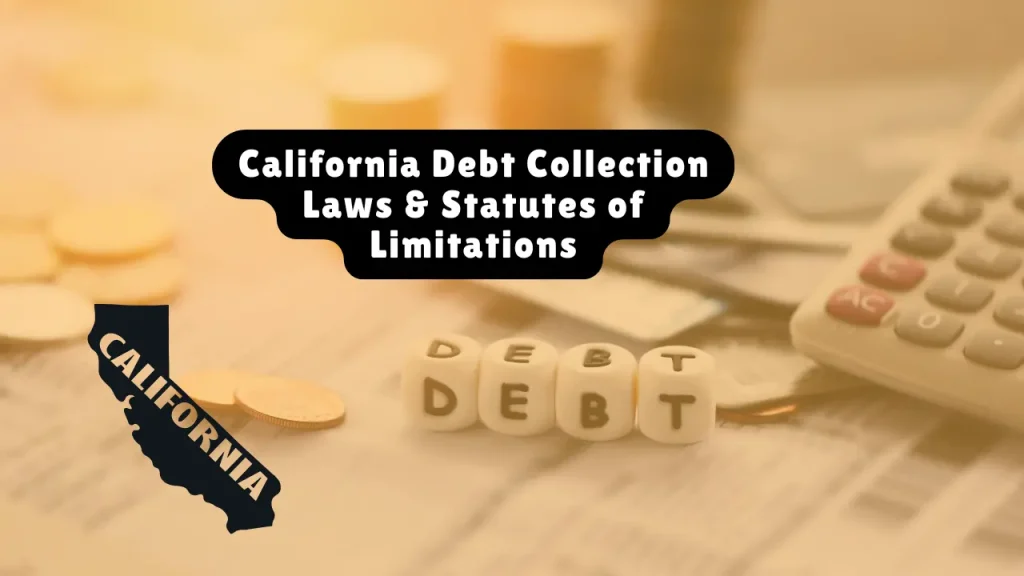California Debt Collection Laws & Statutes of Limitations
California’s debt collection landscape is evolving rapidly. With new legislative developments like Senate Bill 1286 and aggressive debt recovery tactics by collectors, understanding your rights and obligations is more crucial than ever. This 2025 guide combines robust legal protections, statute of limitations (SOL) rules, and strategic responses into a single survival manual for California consumers and small businesses.
Table of Contents
I. What Is a Statute of Limitations (SOL)?
The SOL is a legal deadline for filing a debt collection lawsuit. After the SOL expires, a debt becomes “time-barred”—collectors may still attempt to recover the debt, but they cannot sue. California Civil Procedure Code (CCP) sections 337, 339, and others define these timelines.
II. Statute of Limitations by Debt Type
| Debt Category | SOL Period | Trigger Date | Legal Reference |
| Credit Cards (Written Contract) | 4 years | Last payment/charge | CCP §337 |
| Medical Bills | 4 years | Service date | Various Statutes |
| Auto Loans | 4 years | Last payment due date | |
| Oral Agreements | 2 years | Breach date | CCP §339 |
| Personal Loans (Written) | 4 years | Breach date | CCP §337 |
| Promissory Note | 6 years | First missed payment | Com C §3118 |
| Mortgage Debt | 6 years | First missed payment | |
| Tax Debts | 20 years | Tax due date |
Tolling Provisions:
- Debtor leaves California: CCP §351
- Bankruptcy: CCP §356
- Written agreement to extend: CCP §360
- COVID judicial tolling (Apr–Oct 2020)
III. How Collectors Illegally Reset the Clock
Debt collectors may use underhanded tactics to reset SOL:
- Accepting partial payments (even $5)
- Verbal admissions (“I owe this debt”)
- Signing new repayment plans
- Making new charges on dormant accounts
Legal Reset Criteria: Only a written, signed promise resets SOL.
Consumer Alert: Over 43% of collectors rely on partial payments to revive expired debt. Never interact without legal guidance.
IV. Your Legal Protections: State & Federal
A. Rosenthal Fair Debt Collection Practices Act (California)
Applies to original creditors, third-party collectors, and (starting July 1, 2025) small business debt collectors for debts ≤ $500,000 (SB 1286).
Prohibited Practices:
- Harassment (calls outside 8 a.m.–9 p.m., profanity, threats)
- False representations (police impersonation, fake lawsuits)
- Public shaming (social media, robocalls)
- Suing on time-barred debts
Penalties: $100–$1,000 per violation + attorney fees
B. Federal Fair Debt Collection Practices Act (FDCPA)
Covers third-party debt collectors only.
Key Rights:
- Validation notice within 5 days
- 30-day dispute window suspends collection until proof is provided
- Written cease requests must be honored
Penalties: $1,000 per violation + actual and emotional damages (15 U.S.C. §1692k)
Related article: How to Answer a Summons Without a Lawyer? Step-by-Step Guide

V. SB 1286 (Effective July 1, 2025): Commercial Debt Protections
Expands Rosenthal protections to:
- Small business debts ≤ $500,000
- Personal guarantors of commercial loans
New Prohibitions:
- Robocalls and AI-based harassment
- Fake “settlement” letters used to reset SOL
- Misrepresentation, excessive fees, and deceptive communications
Liability: Debt buyers and collectors face the same penalties as in consumer cases.
VI. Dealing with Time-Barred (“Zombie”) Debts
Expired debts may still:
- Appear on credit reports (up to 7 years from first delinquency)
- Trigger collection attempts
- Be illegally “re-aged”
Strategic Responses:
- Demand validation in writing
- Send cease communication letter: “Per FDCPA §805(c), this debt is time-barred. Cease all contact.”
- Report violations to CA Attorney General, FTC, or DFPI
VII. Lawsuit Defense & Consequences
A. If Sued Within SOL
- File written answer: raise SOL, improper service, or lack of proof
- Demand proof: last payment date, ownership chain
- Negotiate settlements (30–40% lump sum)
B. If Sued After SOL Expiry
- Raise time-barred defense immediately
- File motion to dismiss or vacate default judgment
- Consider countersuing for FDCPA/Rosenthal violations
Consequences of Ignoring Lawsuits:
- Wage garnishment (25% max, exemptions for SSI/VA)
- Bank levies
- Tax refund seizures
- 20-year enforceability with interest accrual (7–10% annually)
VIII. Legal Remedies & Key Cases
Remedies for Violations:
- Actual damages
- Statutory penalties ($100–$1,000/violation)
- Attorney fees (Rosenthal & FDCPA)
Case Law:
- Boechler v. IRS (2022): Clarified tolling rules
- Parsons v. Tickner (1995): Discovery rule for late breach identification
IX. Tools, Resources & Support
- AnnualCreditReport.com: Check for re-aging
- Legal Aid CA: Free legal services
- California DFPI: File complaints
- Sample letters: Debt validation, cease-and-desist, SOL defenses
- Court self-help: selfhelp.courts.ca.gov
X. Final Takeaways for 2025
- Know your SOL: Most debts have a 2–4-year limit
- Don’t reset expired debts: No payments, no acknowledgments
- Document everything: Record calls, retain letters
- Seek legal help for debts >$10,000, bank levies, or unclear SOL
- Bankruptcy may offer full discharge (Chapter 7 = ~3 months)
“Debt collectors win 80% of lawsuits by default. Responding is your strongest defense.” — California Department of Justice
About the Author

Sarah Klein, JD, is a former consumer rights attorney who spent years helping clients with issues like unfair billing, product disputes, and debt collection practices. At All About Lawyer, she simplifies consumer protection laws so readers can defend their rights and resolve problems with confidence.
Read more about Sarah
